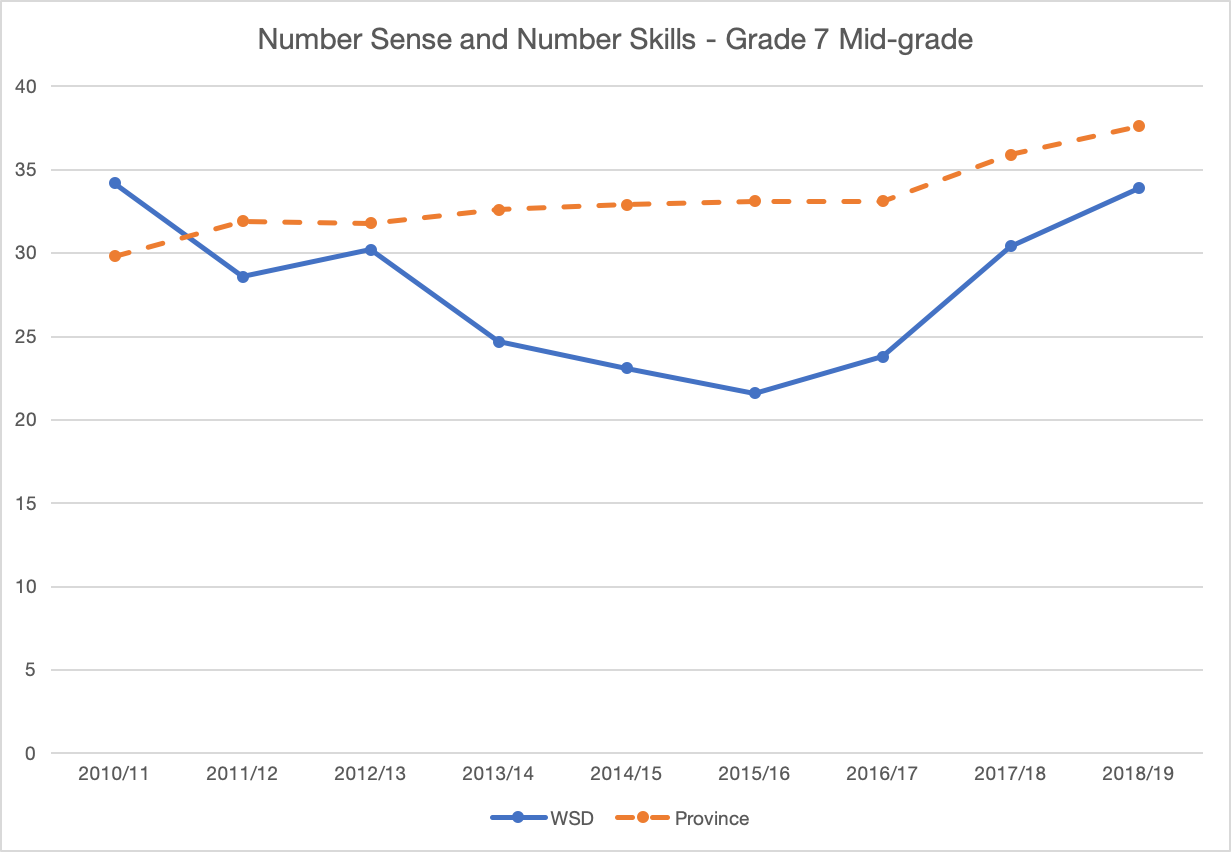K-12 Framework for Continuous Improvement
July 10, 2024
Resources
2018-2019 Report and 2019-2020 Plan
ABOUT WINNIPEG SCHOOL DIVISION
Since 1871, Winnipeg School Division (WSD) has been a catalyst for public education for many students. Currently, the division operates 78 schools, located in the most densely populated areas of Winnipeg. WSD collectively teaches approximately 33,000 students annually representing approximately 17.5 percent of the total students enrolled in Manitoba. WSD is home to a wide variety of programming for students including Nursery to Grade 12, alternative programming, advanced programming, language programming and special education for students with exceptional needs.
Winnipeg School Division is the most culturally and socio-economically diverse division in Manitoba, with approximately 21 percent of students receiving English as an Additional Language Services and 27 percent of students self-declaring as Indigenous.
WSD is committed to a vast array of programming and initiatives that allow students to continue lifelong learning and enrichment. WSD offers support and services for adolescent parents to succeed as parents and learners. New Canadian families and students from a variety of diverse cultures are supported with programming to help ensure success in WSD schools and communities.
WSD's many graduation initiatives, including Indigenous Graduation Coaches, Morningstar and Student Success Initiative, have demonstrated enhanced student achievement and graduation rates.
Student wellness, safety and development are priorities that are evident in programming such as school therapy and counselling services. WSD is a leader in LGBTTQ+ and human rights and continues to excel in these areas.
Based on our long history and as leaders in provincial education, we welcome the opportunity to share this comprehensive report and plan, ensuring coherence, capacity building, data-informed decision-making and shared responsibility for student achievement.
Strengths
Winnipeg School Division has many success stories of our students, leading examples of innovation and technology, and many amazing teachers, administrators, and staff dedicated to serving our children everyday. WSD continues to be committed to improving graduation rates. Through student services programs that promote healthy minds, the Indigenous Graduation Program and many other initiatives, we are seeing more and more young people thrive in our schools and achieve their diplomas. We are also welcoming more newcomers and refugees to our division every year and are thankful for the diversity and multiculturalism that we enjoy among our students and staff.
Partnerships are a key foundation for Winnipeg School Division and we are grateful for the many community, provincial and federal organizations who work with us throughout the year. It is because of these commitments to each other that we are able to deliver on our promise of a learning environment that fosters the growth of each student's potential and provide equitable opportunity to develop the knowledge, skills and values necessary for meaningful participation in a global and diverse society.
Challenges
One of the barriers to learning is the stability and mobility of children and families. The data collected at the elementary and secondary levels has shown a slight improvement in stability and mobility over the past three years. Demographics also show:
- an increasing number of children are in care or are known to CFS;
- there is a growing number of children entering school with social and emotional challenges; and
- it is becoming progressively more difficult to find trained teachers to staff French Immersion and Indigenous language programs.
WINNIPEG SCHOOL DIVISION PROFILE
Senior Administration Team
The Chief Superintendent of Schools is the Chief Executive and Education Officer of the Board and is hired by the Board of Trustees to manage the affairs of the school division.
A Senior Administration team reports to the Chief Superintendent and supports all aspects of the Winnipeg School Division (WSD) including education and curriculum, planning, system services, human resources, buildings, transportation, community and board services, and communications. The Senior Administration is supported by a team of administrative assistants with extensive in-school experience and knowledge.
Three Superintendents of Education Services and six Directors are directly responsible for school contact.
Superintendents of Education Services and all six Directors are responsible for the general direction and coordination of all matters relevant to the delivery of educational services in schools. Each Director is responsible for a group of schools, approximately 15 each, and all aspects related to staffing, supervision and performance evaluations, budget development and allocation, and direction to principals on the delivery of programs and services.
In addition, each Superintendent and Director holds a portfolio of programs for development and implementation across the division.
The Secretary Treasurer / Chief Financial Officer is responsible for all areas of finance and budgeting for WSD. Reporting to the Secretary Treasurer are the Director of Buildings and the Assistant Secretary-Treasurer.
The Director of Buildings oversees all maintenance, repairs and new construction throughout the division. In addition to supporting the finance department, the Assistant Secretary Treasurer oversees Transportation Services.
The Board and Community Liaison Services Officer is responsible for all aspects of supporting the WSD Board of Trustees including agenda development, minutes, correspondence and meetings. This office also supports outreach and collaboration with parents, community and community organizations, assist in resolving matters of concern to parents, work with school staff and examines the development of schools as centres of the community.
The Chief Human Resource Officer is responsible for staffing, labour relations, and professional development programs for WSD employees.
The Organizational Development Officer is responsible for managing and supporting the assessment of organizational needs and the design, implementation and support of a variety of programs and division initiatives.
The Senior Information Officer is responsible for communications with internal and external audiences including planning and resource allocation, brand development and implementation, media relations, social media and website presence, and WSD publications.
Staffing Profile (as of April 30, 2019)
| Position | Full-time Equivalent |
| Principals | 79 |
| Vice Principals | 66 |
| Teachers | 2078 |
| Guidance Counsellors | 68 |
| Resource Teachers | 59 |
| Spec. Needs/Low Enrollment Teachers | 136 |
| Educational Assistants | 1299 |
| Speech Language Pathologists | 32 |
| Reading Clinicians | 15 |
| Occupational Therapists | 0 |
| Physiotherapists | 0 |
| Psychologists | 32 |
| Social Workers | 28 |
| Other professional Staff - Clinical Support Services Area Service Directors | 6 |
| Program Leads | 10 |
| Substitute Staff | 2103 |
| Other Staff (Clerical, Custodial, Trades) | 432 |
| Total staff as of April 30, 2019 | 6441 |
Student Population Profile (as of September 30, 2018)
| Disaggregation | Number of Students | Percentage of Population |
| Students receiving English as an Additional Language (EAL) services1 | 6725 | 20.8 |
| Self-declared Indigenous students | 8625 | 26.7 |
| Balance of Students | 16931 | 52.5 |
| Total | 32281 | 100 |
As per Provincial guidelines, students receiving EAL services are not identified until the spring of their Kindergarten year, therefore Nursery and Kindergarten students are excluded from this number.
Students in care, identified as any student under the care of Child and Family Services (CFS) accounted for 4.8 percent of the student population.
| Disaggregation | Number of Students | Percentage of Population |
| Early French Immersion | 4633 | 14.4 |
| Late French Immersion | 84 | 0.26 |
| Hebrew/English | 207 | 0.64 |
| Ukrainian/English | 32 | 0.099 |
| Spanish/English | 39 | 0.12 |
| Cree/English | 23 | 0.07 |
| Ojibway/English | 28 | 0.09 |
| English | 27235 | 84.4 |
| Total | 32281 | 100 |
EQUITY
Winnipeg School Division continually reviews and revises policies and introduces programming to reflect accurately its priorities, values, purpose and vision. These policies and programs ensure a positive learning environment that respects the intrinsic value of each student with an underpinning of social justice, inclusiveness, and a safe environment; a robust and challenging curriculum, well-trained staff, adequate technology, and equitable access to learning opportunities; and provide students opportunities and educational means to develop their own skills, talents, and life plan.
Five important policies that enhance social justice inclusiveness and a safe environment:
- Policy AC Human Rights demonstrates WSD's commitment to creating and maintaining an environment in which students, parents and employees are aware of and respect the rights and human dignity of others.
- Policy IGAB Diversity and Equity Education commits WSD to an educational philosophy that recognizes the fundamental equality of people of all origins, abilities, gender identity, sexual orientation, age, ethnic origin, ancestry, culture, socio-economic background or status, religion or spirituality, family status, mental and physical abilities, physical features including body size and shape, intelligence or ability, learning preferences, ancestry or place of birth, first language or mother tongue.
- Policy IGABB Safe and Caring Policy – Trans and Gender Diverse Students and Staff commits to providing learning opportunities, dignity, respect and equity for all including trans and gender diverse students and staff.
- Policy JJD Right to Participate was created in regard to student activities and supplemental school fees to ensure that no student is excluded from participating in activities based on their ability to pay supplemental school fees.
- Policy IGDF Fundraising in Schools was revised to honour the dignity of every student and their family and their ability to participate in the fundraising process. This means the exclusion of incentive prizes and the ability to opt out of any fundraising activities.
EDUCATION FOR SUSTAINABLE DEVELOPMENT
Winnipeg School Division believes in developing responsible decision-makers and global citizens, who contribute to the social, cultural, environmental, and economic well-being to ensure a sustainable future for all. "Enough for All Forever" is Winnipeg School Division's Education for Sustainable Development definition.
WSD follows these eight guiding principles for practicing sustainability in our schools:
- Winnipeg School Division schools and departments strive to follow sustainable practices in the social, environmental, and economic realms.
- Winnipeg School Division teaches, encourages, and demonstrates critical thinking about global and environmental issues including inequalities of the sharing distribution of global resources and political power (Manitoba Education).
- Students develop the knowledge, skills, and values necessary for meaningful participation in a global and pluralistic society.
- Education for Sustainable Development educates students, staff, and the broader community, of the importance of sustainable living for human survival and the survival of all living things.
- Traditional Indigenous perspectives regarding our relationship with Mother Earth, such as our responsibility to ensure the survival of the Seventh Generation and collective responsibility, are incorporated in the Winnipeg School Division Sustainable Development Plan.
- Winnipeg School Division models the principles of sustainability taught in the classroom.
- Winnipeg School Division recognizes the importance of families and values cultural diversity and community partnerships while working toward a sustainable future for all.
- Winnipeg School Division practices recognize and support the connection between healthy lifestyles and sustainable living.
All 78 schools in Winnipeg School Division have an Education for Sustainable Development Plan.
GRANTS
Indigenous Academic Achievement (IAA)
Through the IAA grant, WSD has made significant progress in implementing Indigenous education initiatives. In progress to-date are:
- Five Indigenous Programming Support Teachers providing professional learning opportunities for Principals, Teachers, Education Assistants and Community Support Workers.
- Treaty Education Training is provided and supported in the classrooms.
- Seven Grad Coaches in high schools supporting Indigenous students resulting in positive increases in graduation, attendance and credit attainment.
- Indigenous Leaders within WSD creating a three to four-year Indigenous Education Plan which established seven Action Areas.
WSD is targeting actions to focus on effectiveness of programs and is reviewing the Indigenous Education Policy (IGABA).
A comprehensive overview of the history of Indigenous education in WSD, as well as current programming is included as an appendix to this document.
Literacy and Numeracy
The bulk of this grant is used for the Reading Recovery program, a program the division has offered for 21 years. The funding covers a portion of the 35 teachers in the program and the division supplements this amount. In 2018/19, some of the funding was assigned to WSD's Read to Me program and to supports in numeracy. Detailed reports with the data for students are provided to the Provincial Government on an annual basis. Please refer to that information.
Career Education
Winnipeg School Division is committed to inspiring students to achieve academic success, reach goals and enter the workforce. Preparing for the workforce is an important outcome of education, and through WSD career development, students learn their own strengths and interests. Through a variety of curriculum choices, programs and events, Winnipeg School Division students are able to explore possible future career options. WSD partners with organizations and businesses to monitor the labour market for Winnipeg youth and provide the tools, technology and skills they need to lead to meaningful careers. Many students benefit from these partnerships as they obtain work experience and on-the-job training while they are in school.
FINANCIAL DECLARATION
Winnipeg School Division provides responsible management of tax dollars and resources to ensure long-term fiscal sustainability and accountability of the programs, facilities, and services provided to the community. This includes transparency in the reporting of finances and operations, annual budgets and consultations, implementing long-term capital plans, prioritizing infrastructure renewal, effectively allocating resources, and seeking operational efficiencies.
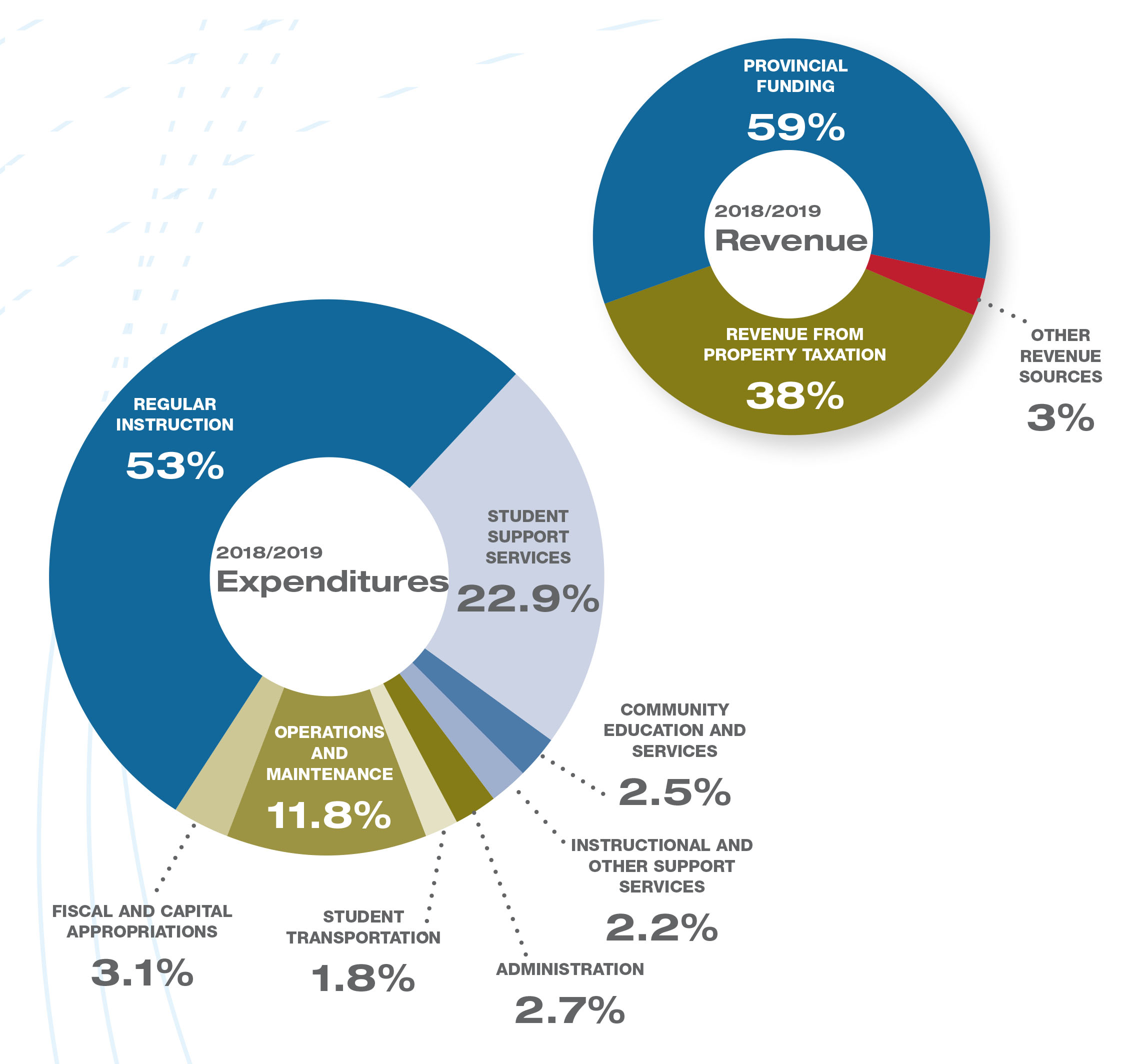
RELEVANT DIVISION WEBSITE LINKS
- Winnipeg School Division Homepage
- WSD Annual Report to the Community
- WSD 2016-2020 Strategic Plan
- WSD 2019-2021 Education for Sustainable Development Plan
- WSD Budget
REPORT ON DATA
EARLY & MIDDLE YEARS LITERACY
Students have benefitted from language-rich classrooms with access to high-interest and inclusive reading materials, increased use of Assessment for Learning strategies, and uninterrupted literacy learning blocks. Students requiring more intensive assistance are supported through targeted instruction, guided reading and other intervention programs selected at the school level. Nine elementary schools have implemented Read to Me, a reading framework focuses on teaching beginning literacy – phonetic awareness, alphabetic principles, fluency, vocabulary, and comprehension in Grades 1 to 3. This framework is having a positive impact on student literacy scores, attendance, and social emotional data.
Mid and year-end assessments indicated that many students previously identified as approaching expectations had received appropriate programming and were performing at grade-level.
Three Middle Years schools have implemented the Read to Me framework that provides for small group intervention for students who are not progressing. Additionally, teachers and Principals/Vice-Principals were supported by members of the Professional Support Services team who engaged in collaborative data analysis, interpretation and planning conversations.
2018/2019 Target
Increase the percentage of students who meet expectations in all three sub-competencies, with a focus on further closing the gap between WSD data and the provincial benchmark.
For both Grade 3 and Grade 4 reading scores, growth in WSD has outpaced provincial growth over the last ten years.
Reading in English – Grade 3 Entry
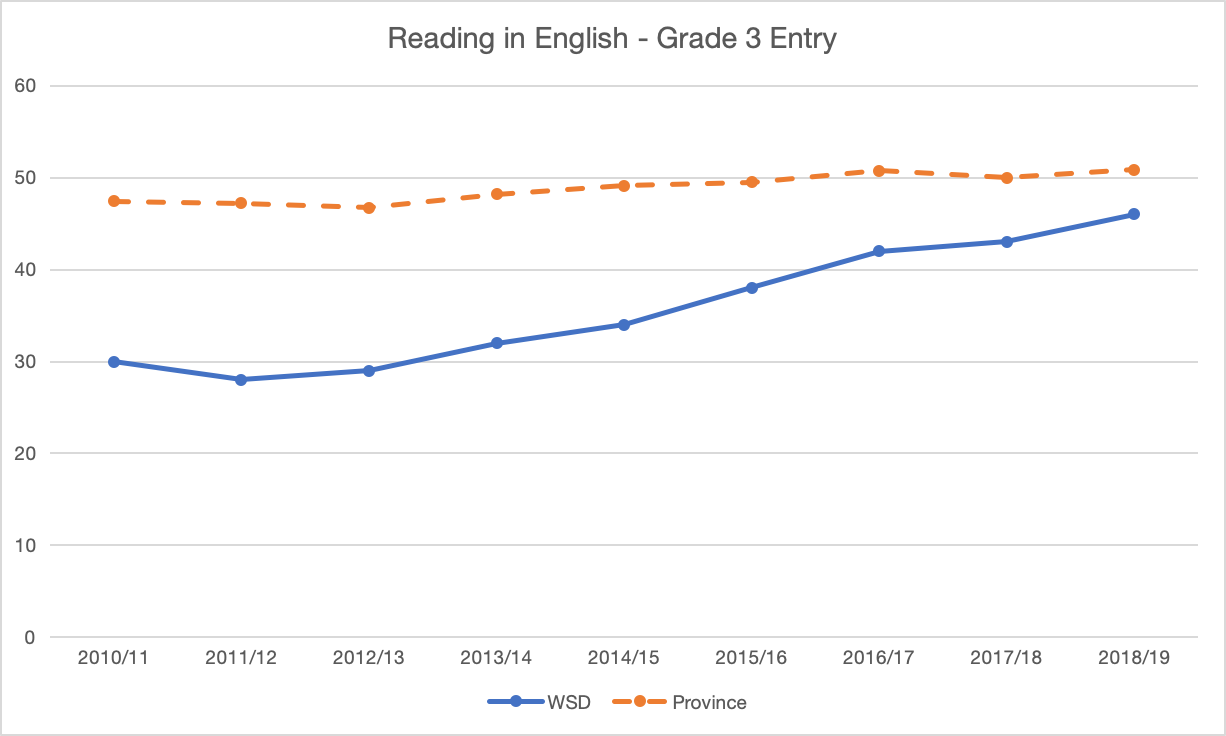
(Based on 2013 to 2018 data)
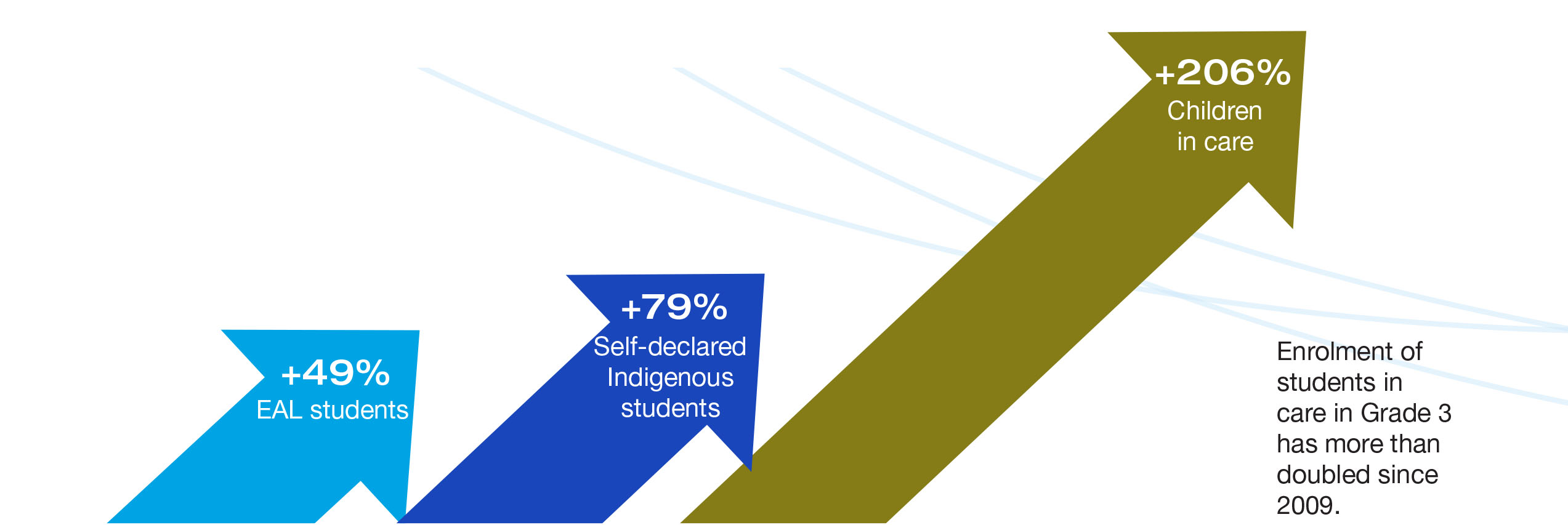
Reading in French – Grade 4 Entry
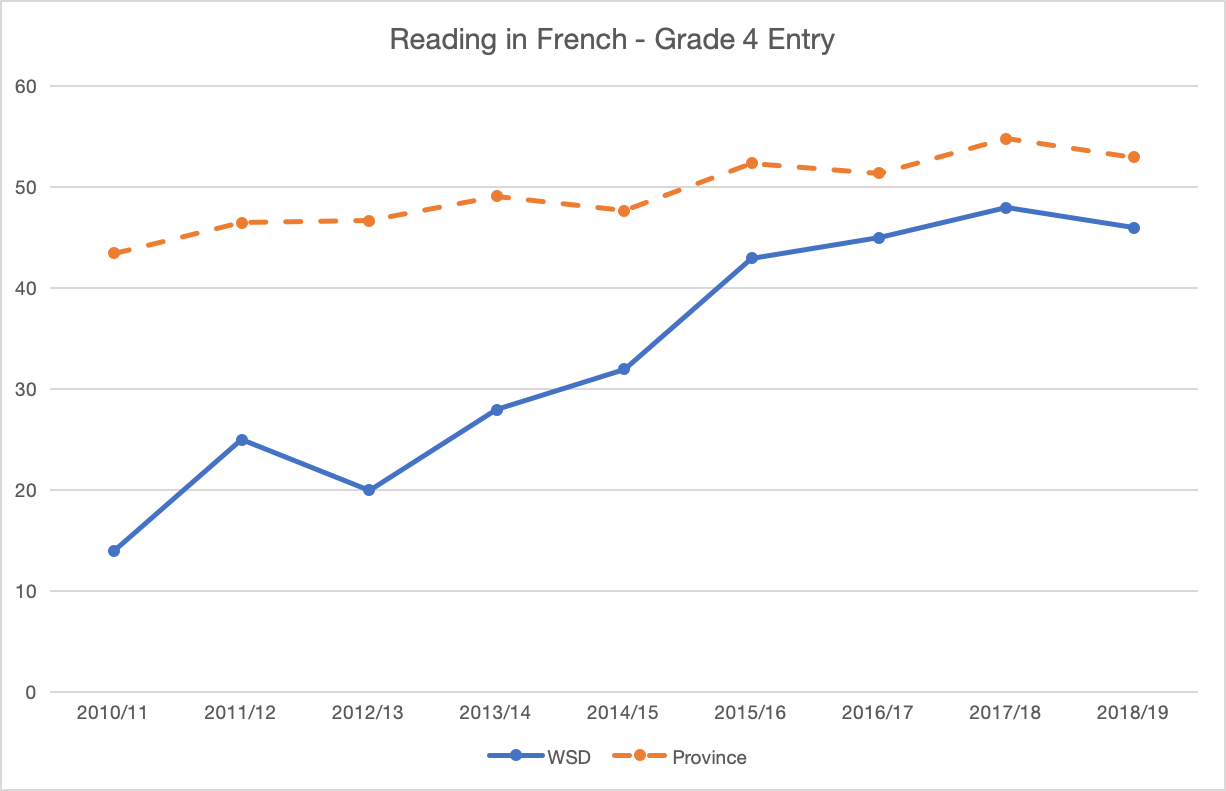
(Based on 2013 to 2018 data)
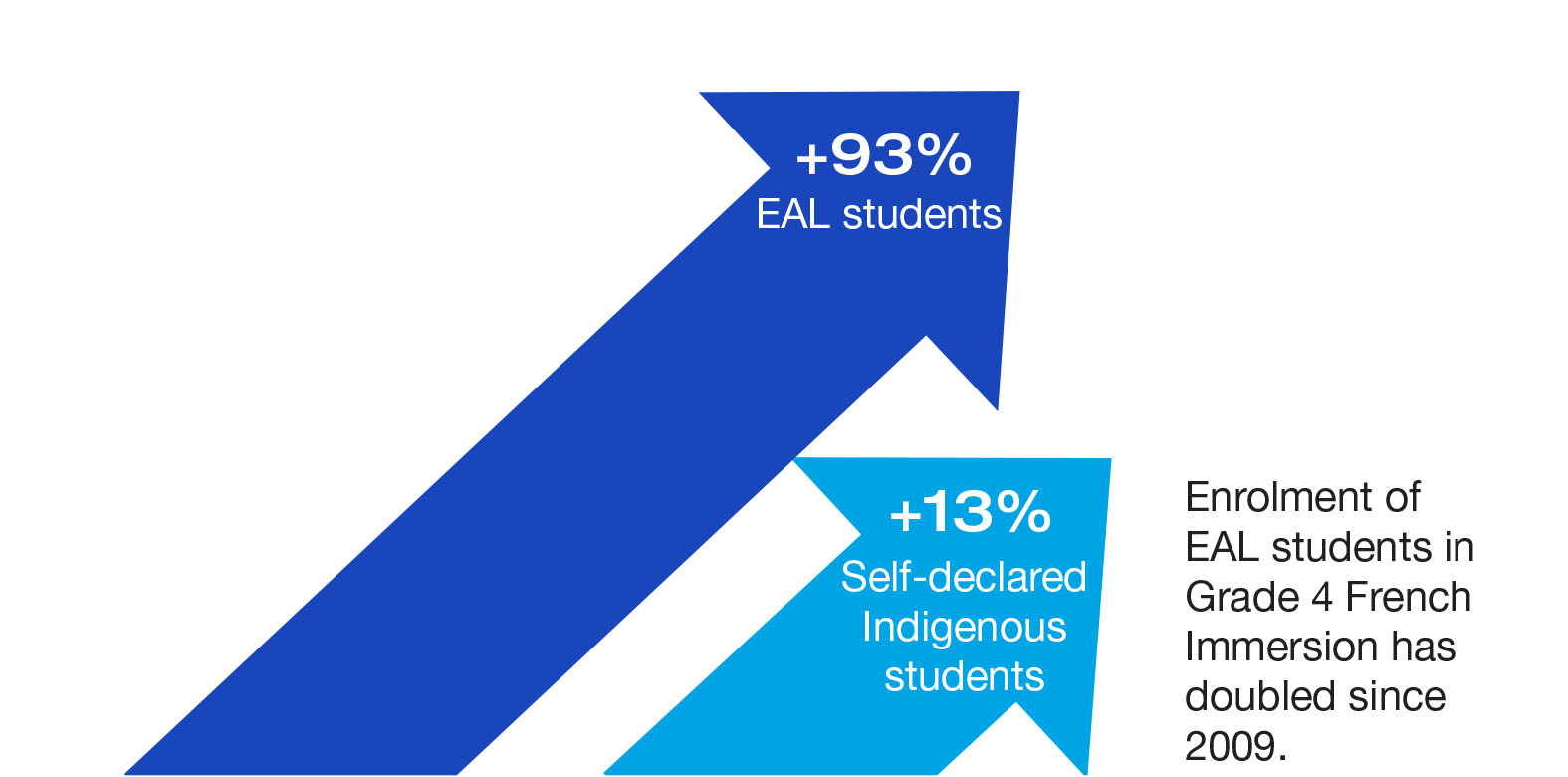
Reading Comprehension and Expository Writing – Grade 8
2018/19 Target
Increase the percentage of students who meet mid-grade expectations in all sub-competencies for reading comprehension and expository writing.
English Language Arts
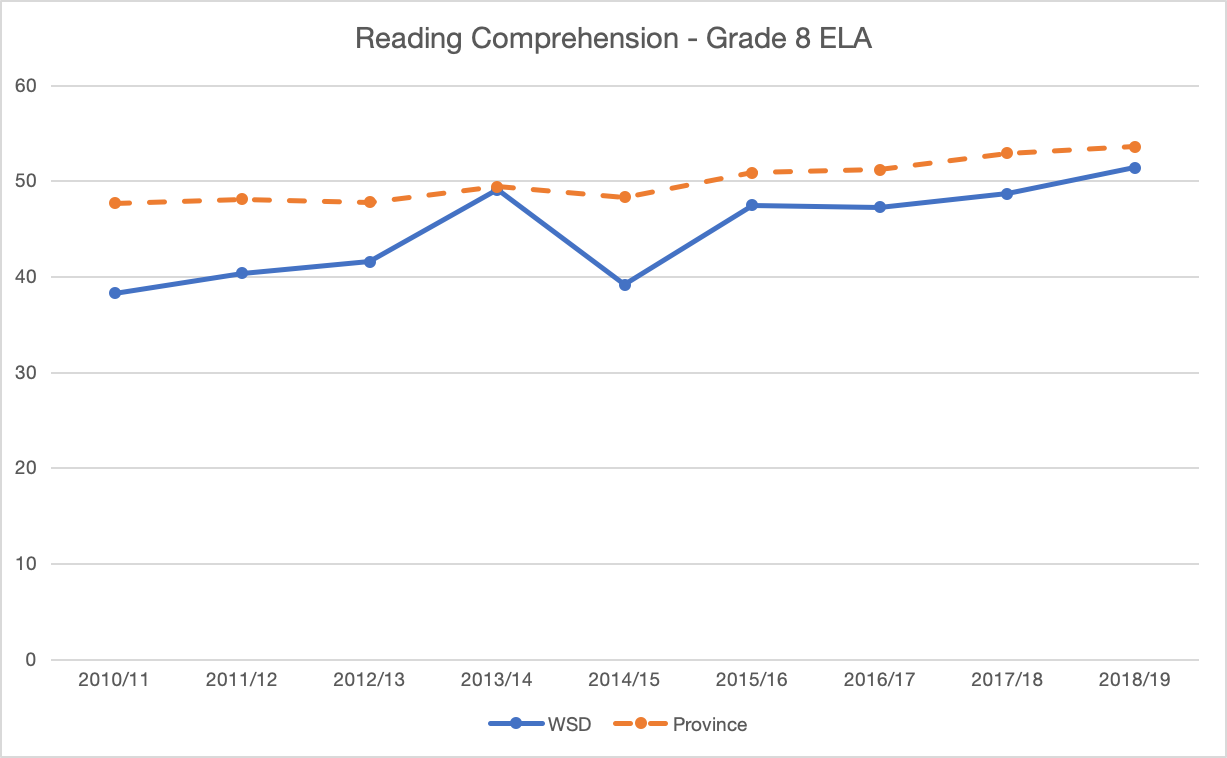
Since 2009, the gap between WSD scores and the provincial average has been decreasing, and has nearly been eliminated in both reading comprehension and expository writing.
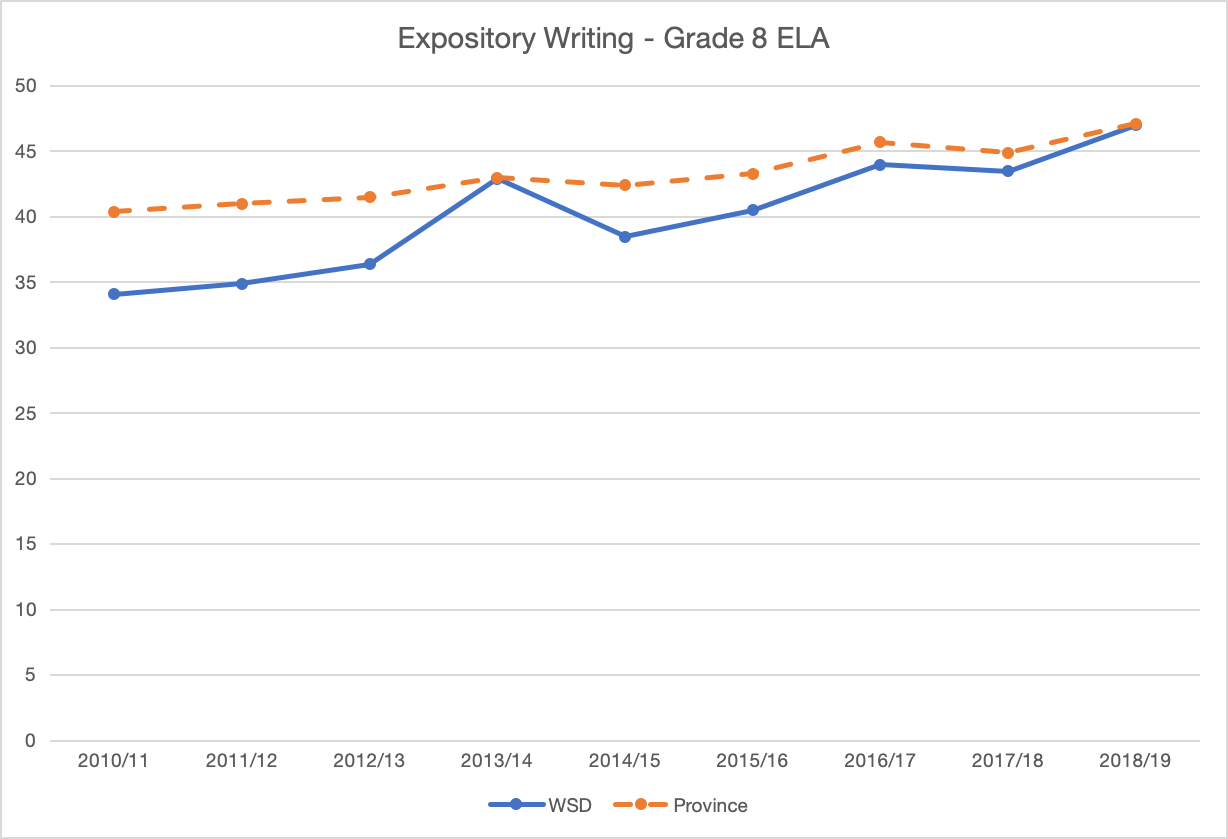
French Language Arts
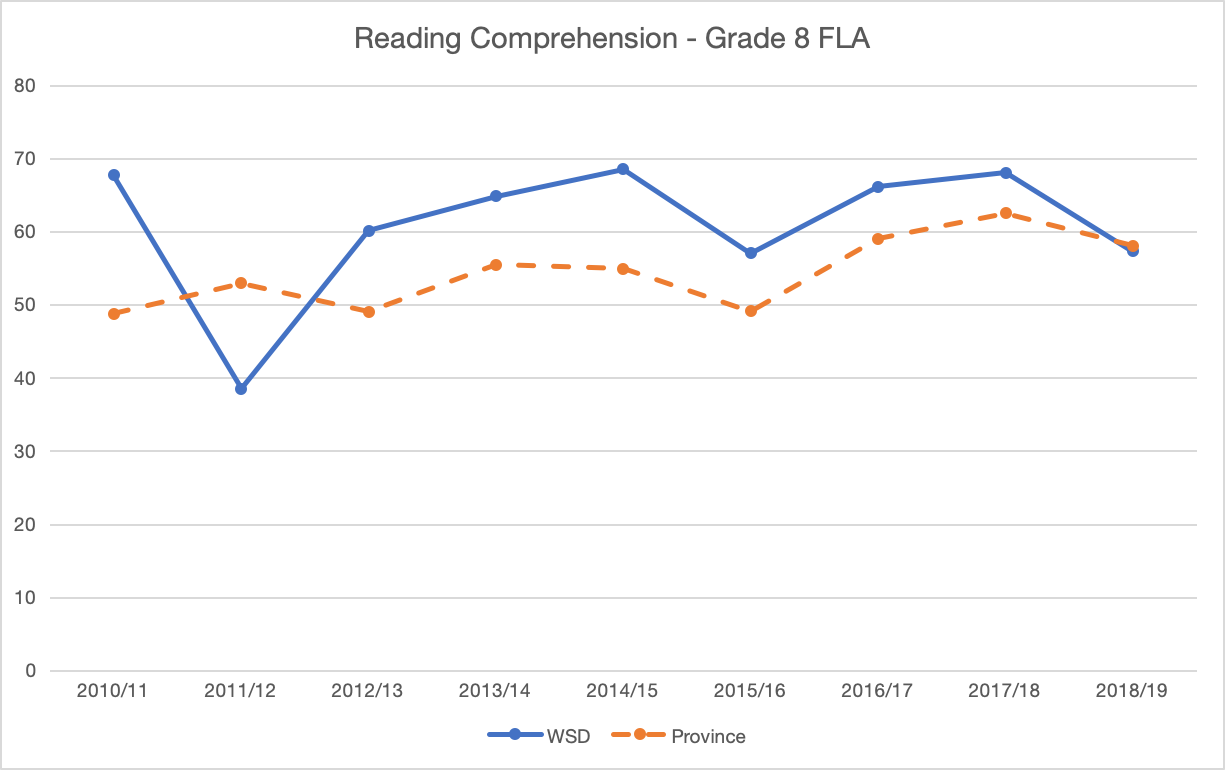
The number of students meeting mid-grade level expectations in all sub-competencies for reading comprehension and expository writing in French has exceeded the provincial average for much of the last decade, with only the last two years seeing a dip below.
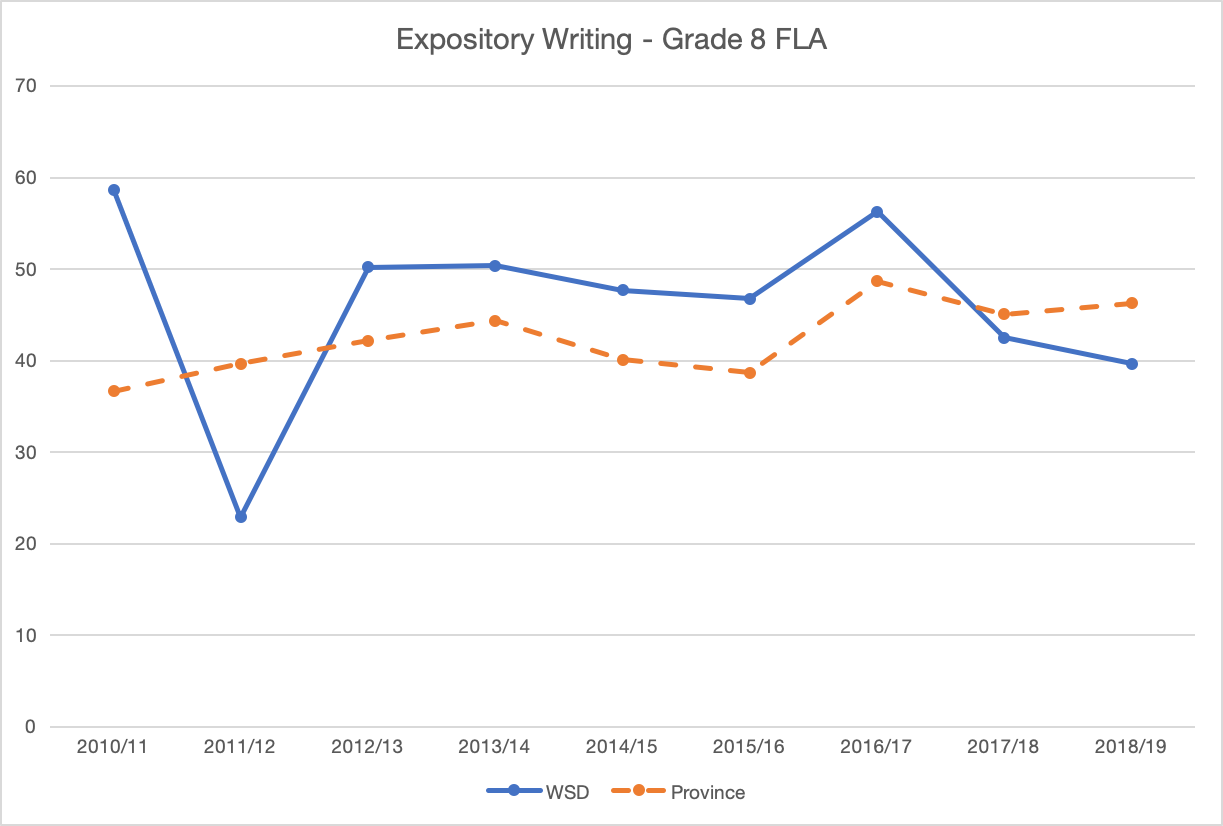
REPORT ON DATA
EARLY & MIDDLE YEARS NUMERACY
Through the work of a task force, initially struck in spring 2016 with final recommendations made to the Board of Trustees in May 2018, Winnipeg School Division reaffirmed its commitment to ensuring numeracy remained a divisional priority. The recommendations of the math task force have helped to inform a multi-pronged approach to supporting both teachers and learners of mathematics. Capacity to foster strong teaching and learning of mathematics has been increased through the work of the Professional Support Services (PSS) group, as well as focused professional development provided to Principals and Vice-Principals. PSS members, alongside classroom teachers, have been included in the learning series “Thinking Classrooms”, facilitated by Peter Liljedahl. Mathematics Department Heads and Team Leaders have attended bi-monthly meetings with areas of focus relevant to supporting teachers in mathematics content knowledge, setting and achievement targets, and the interpretation of data to plan accordingly.
New teachers were provided three half-day sessions, focused on planning for mathematics, gathering and analyzing data, and determining next steps for learning. Two half-day sessions were provided to teachers new to Grade 7. The goal of these sessions was to build stronger understanding of effective mathematics instruction, assessment strategies and provincial assessment processes, and increased knowledge of available resources and support.
Specific to the Early Years, all Grade 3 teachers were required to attend sessions focused on the Grade 3 Entry Assessments. These sessions helped to increase teacher pedagogical and content knowledge, teacher confidence, and processes and protocols for the Grade 3 Provincial Numeracy Assessment.
Numeracy – Grade 3 Entry
2018/19 Target
Increase the percentage of students who meet expectations in all four numeracy sub-competencies.
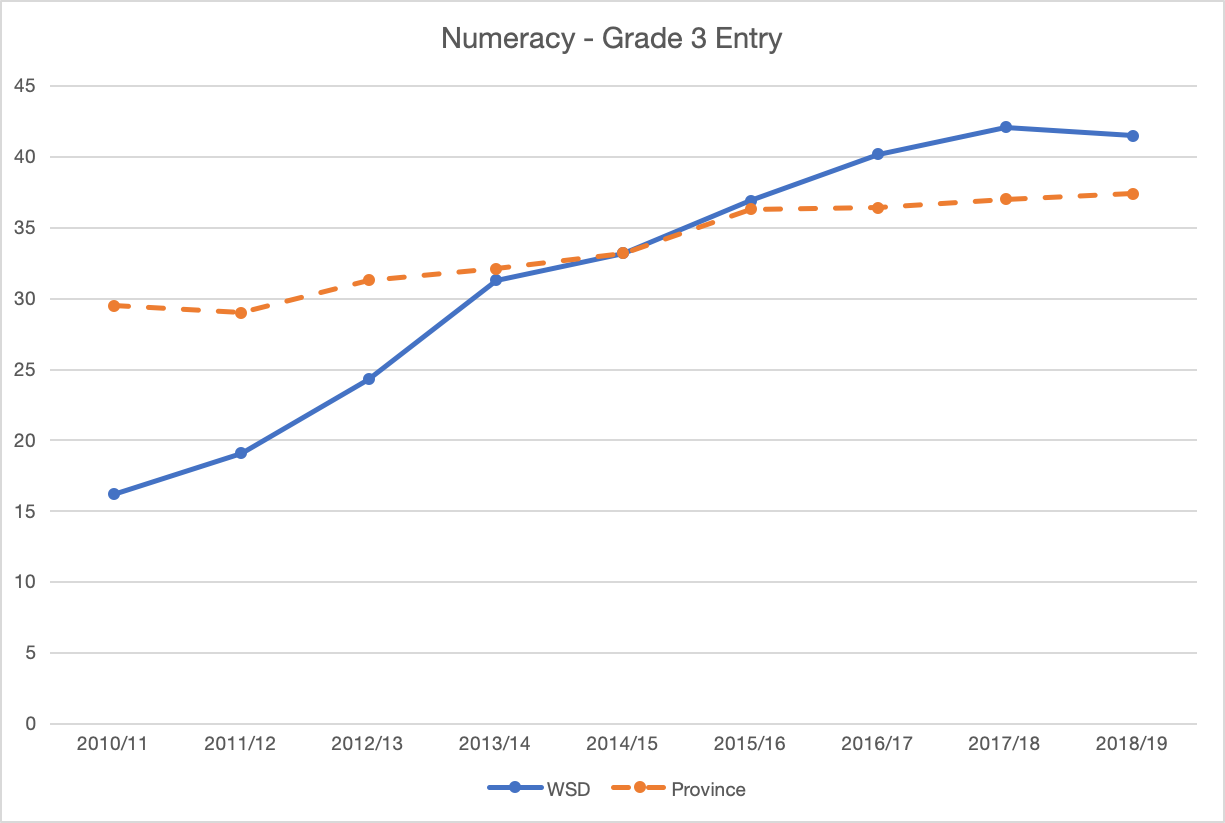
Over the last ten years, growth in achievement in WSD has outpaced that of the province, eliminating the gap and exceeding provincial scores since 2015.
(Based on 2009 to 2018 data)
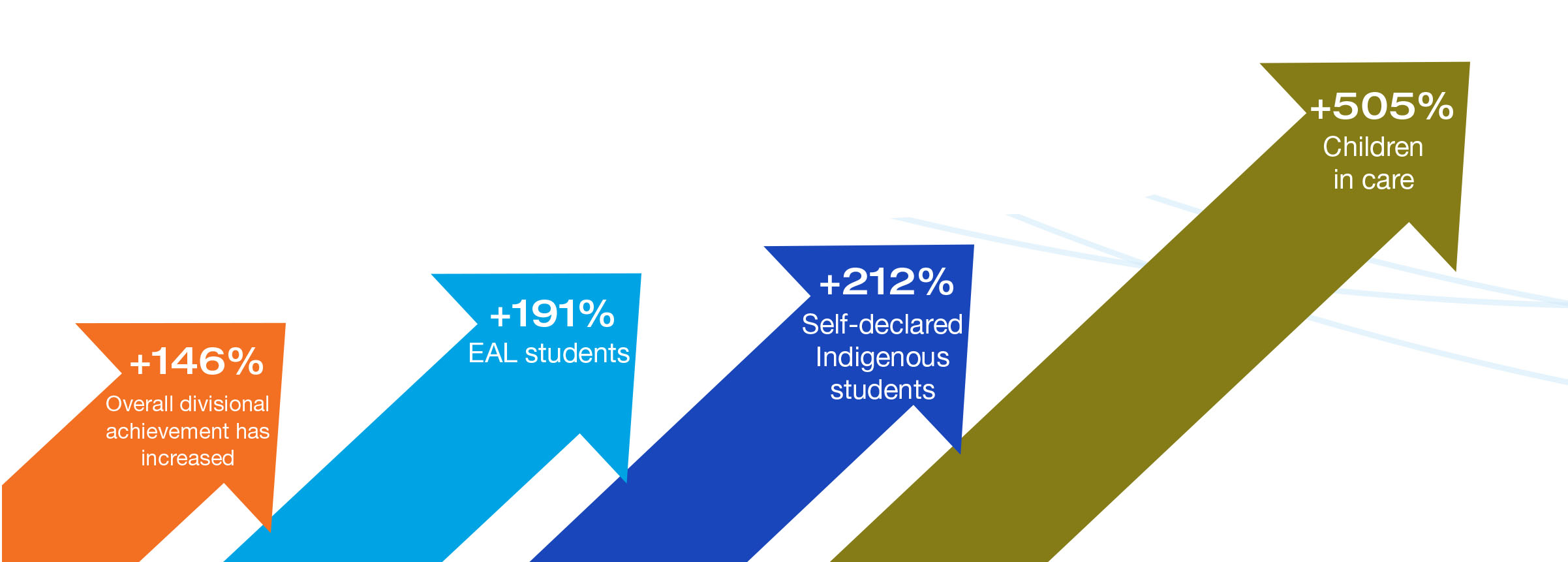
Number Sense and Number Skills – Grade 7
2018/19 Target
Increase the percentage of students who meet mid-grade expectations in all five sub-competencies in number sense and number skills.
(Based on 2015 to 2018 data)
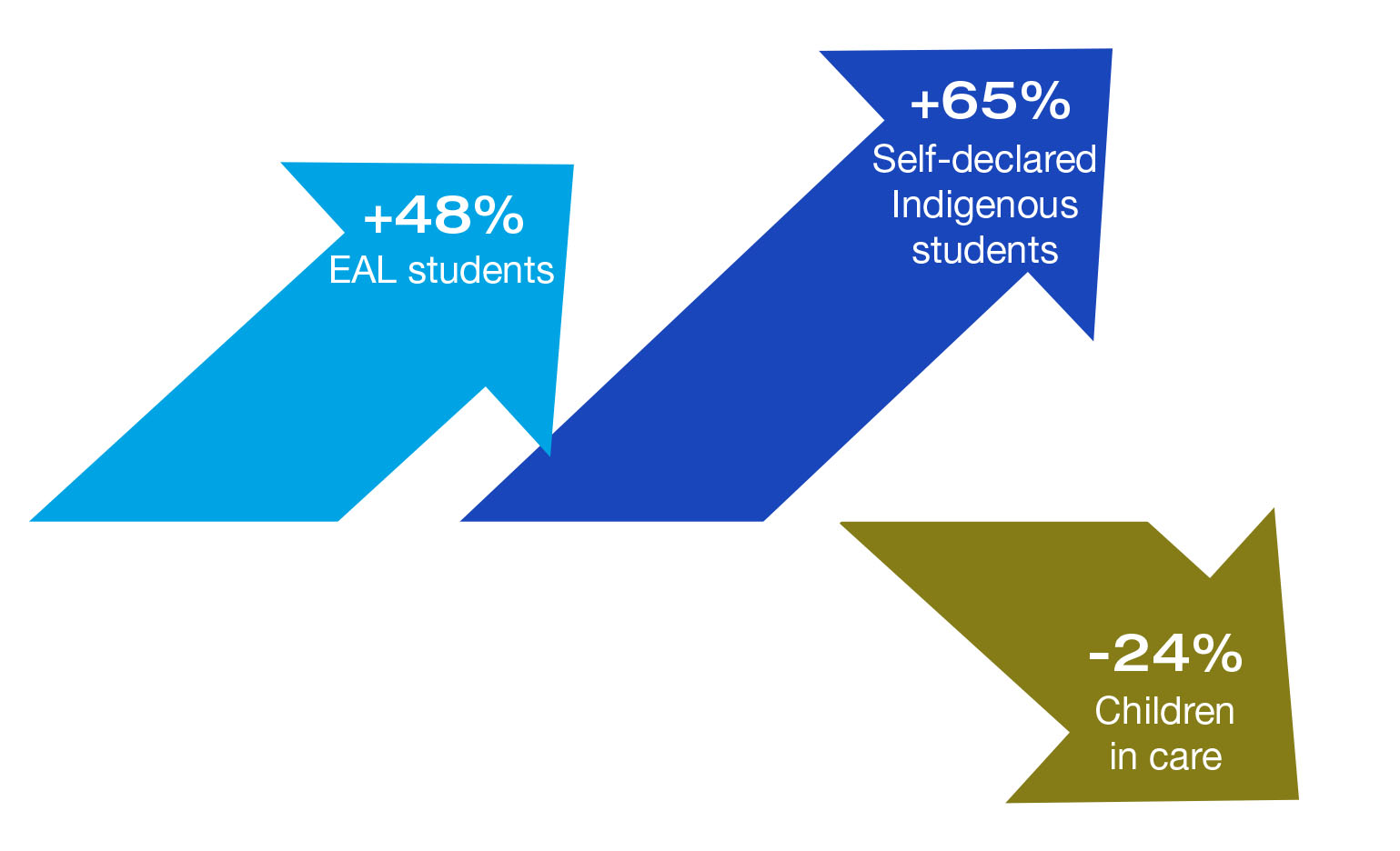
REPORT ON DATA
SENIOR YEARS
Winnipeg School Division has invested significant time, energy and resources in to the transition from high school to post-secondary studies or entry into the workforce. This might mean supporting students through vocational programs such as the Aerospace Manufacturing and Maintenance Orientation Program, where skills are acquired that will lead to a career in the aerospace industry, setting up in-house tutoring services, or working with external agencies to provide crucial wraparound support.
R.B. Russell Vocational High School provides such a support system for all students, which includes academic counselling, addictions, housing and other supports to promote academic achievement, overall well-being and a successful high school experience and transition to post-secondary education and the workplace.
For the last two years, teachers of Grade 12 Pre-Calculus Mathematics have worked in partnership with the University of Manitoba to narrow the gap between student achievement in high school and subsequent performance at the post-secondary level. This has led to a clarification of expectations of both parties, and work toward ensuring students are equipped with the required skill set prior to graduation.
Teachers and Principals/Vice-Principals are supported by Professional Support Services Program Leads in engaging in conversations focused on the data from Grade 12 achievement tests, Grade 12 ELA and Mathematics curricula, and student learning experiences as a whole, in order to increase student achievement on provincial assessments.
Credit Attainment – Grade 9
2018/19 Target
Increase the number of age-appropriate Grade 9 students who are successful, in their first attempt, in earning a Mathematics and English Language Arts credit, with a focus on narrowing the gap between WSD data and the provincial benchmark.
Provincial English Language Arts Achievement Test – Grade 12
2018/19 Target
Increase the average Achievement Test score, with a goal of meeting or exceeding the provincial average.
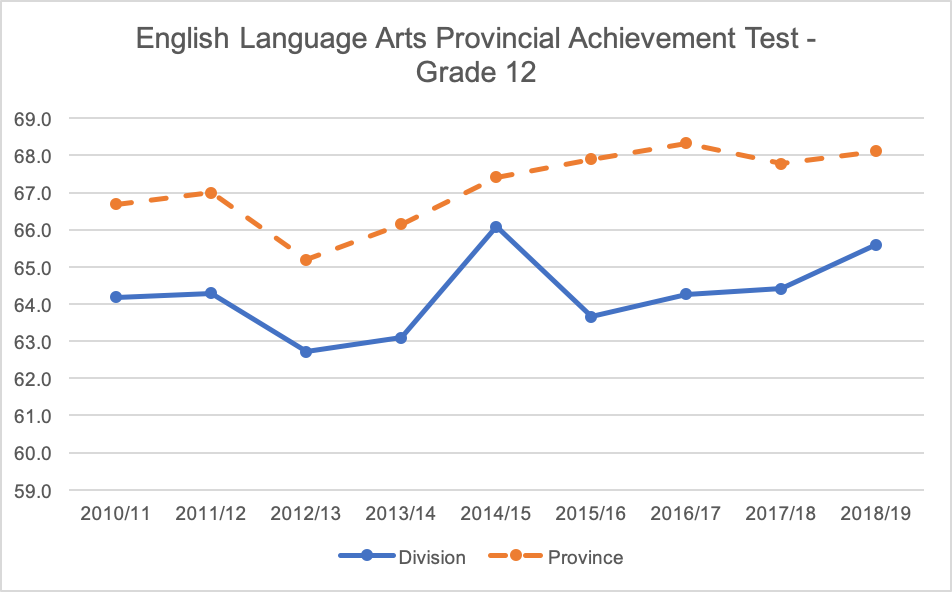
Average Achievement Test scores have remained stable over a period of ten years, with the exception of achievement for EAL students increasing 14 percent, bringing their scores within 5 percent of the provincial average. Over that same time period, the number of EAL students enrolled in Grade 12 English Language Arts has nearly tripled.
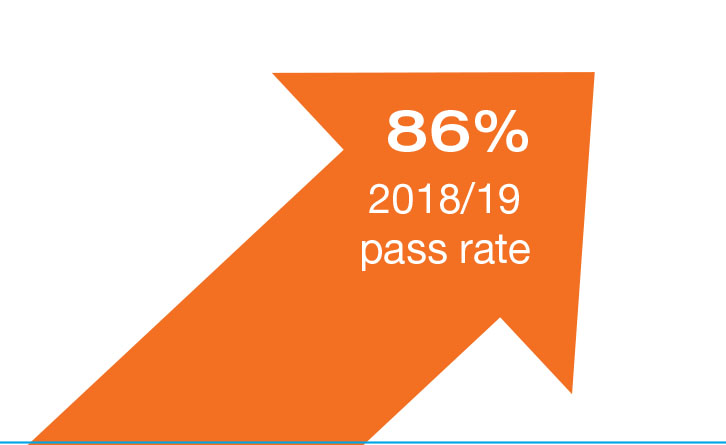
Provincial Mathematics Achievement Tests – Grade 12
2018/19 Target
Increase not only the average Achievement Test score, but also the pass rate, with a focus on narrowing the gap between WSD data and the provincial average for Applied and Essential Mathematics.
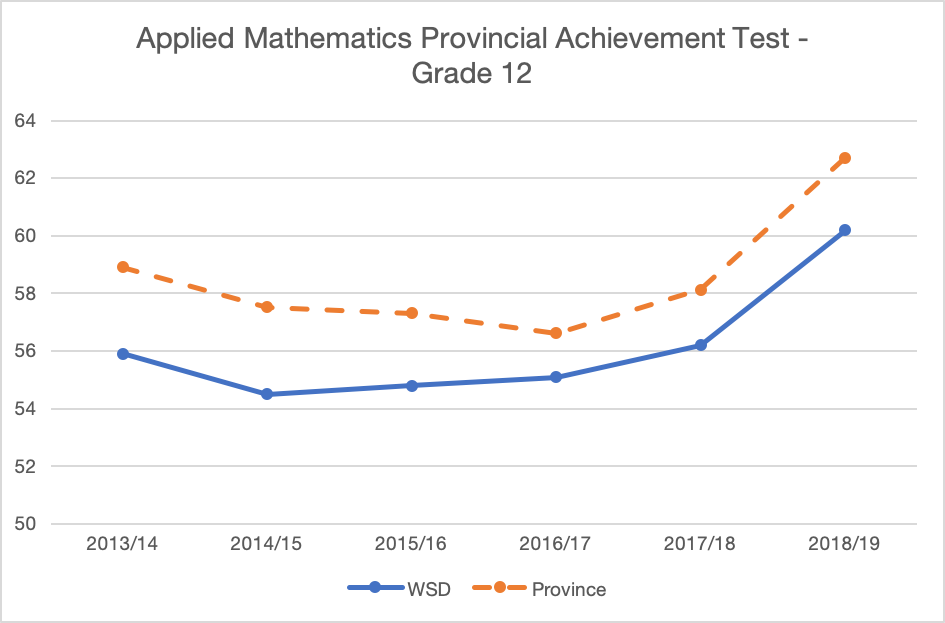
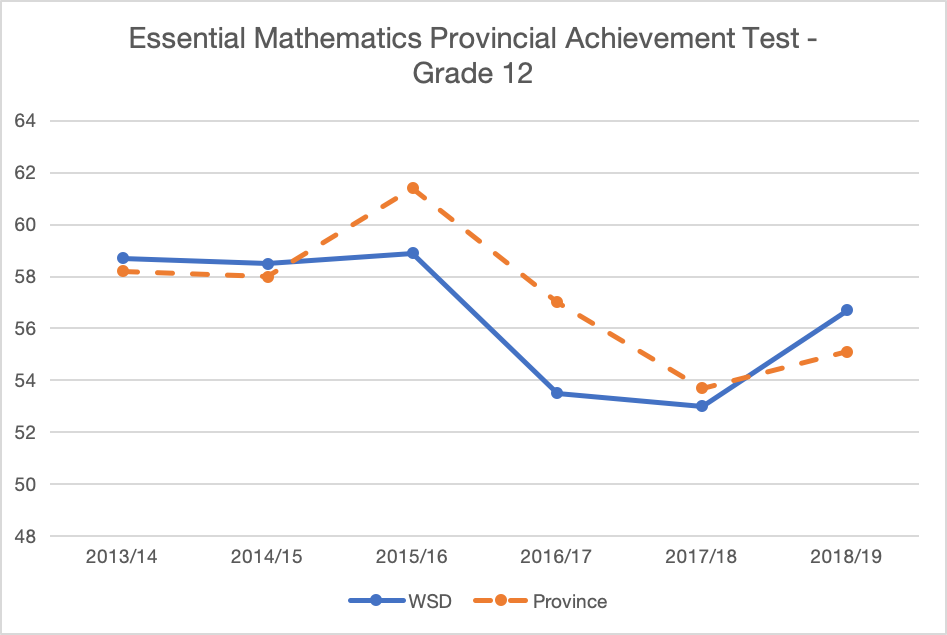
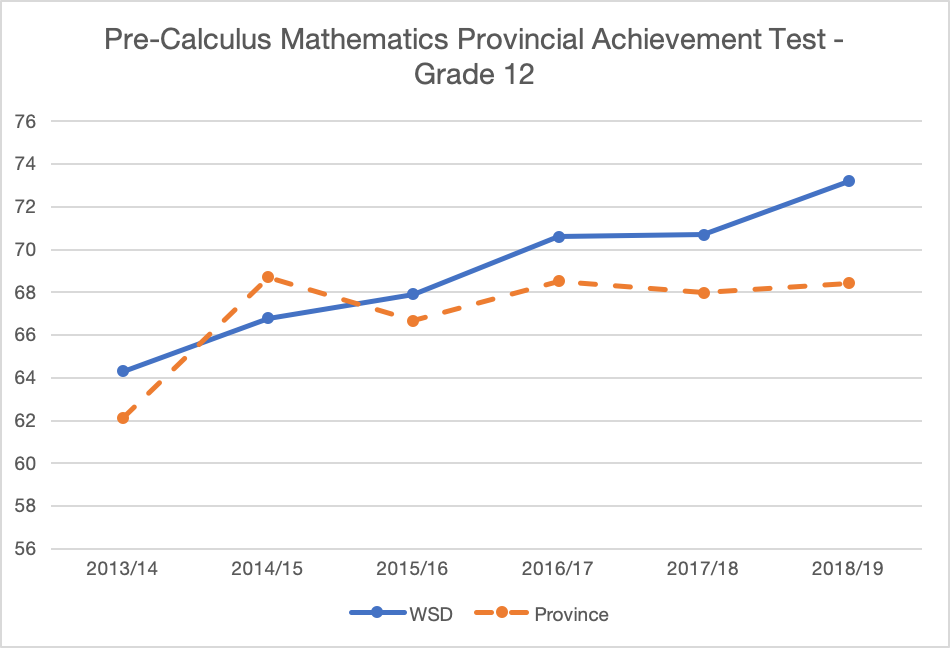
Achievement Test scores since 2013/14
(implementation of new achievement test)
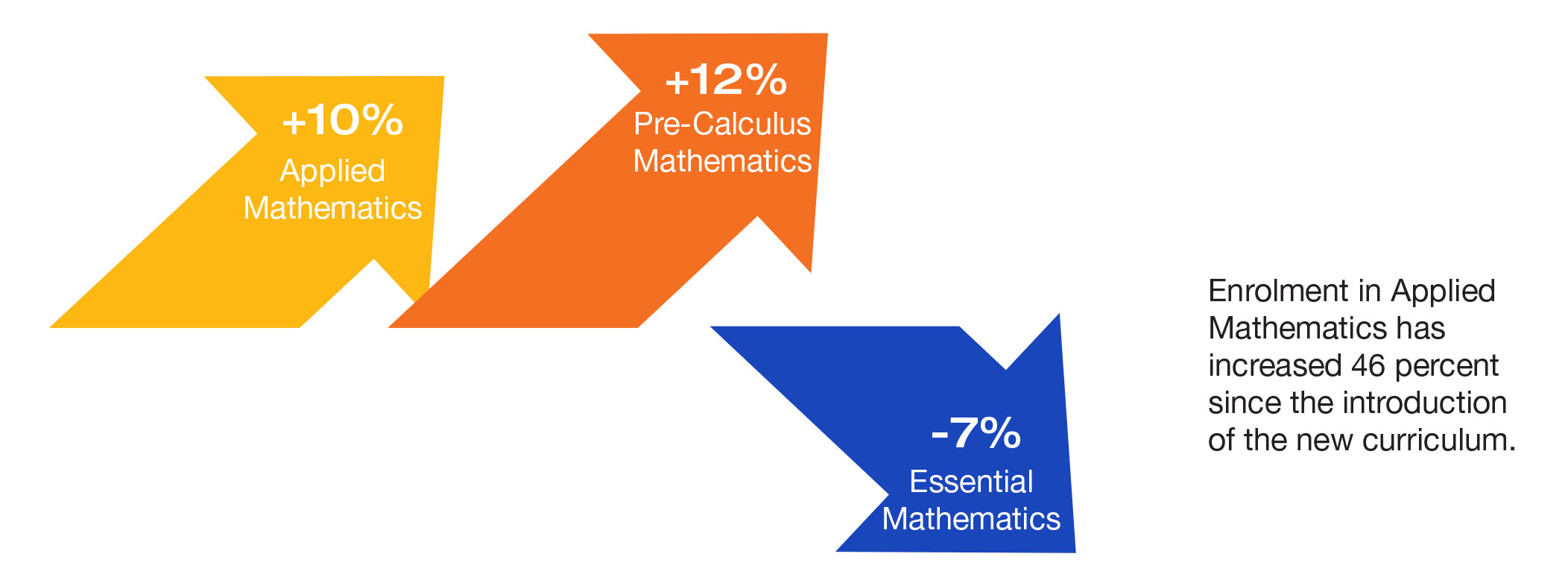
2018/19 Pass Rates

Provincial French Language Arts Achievement Test – Grade 12
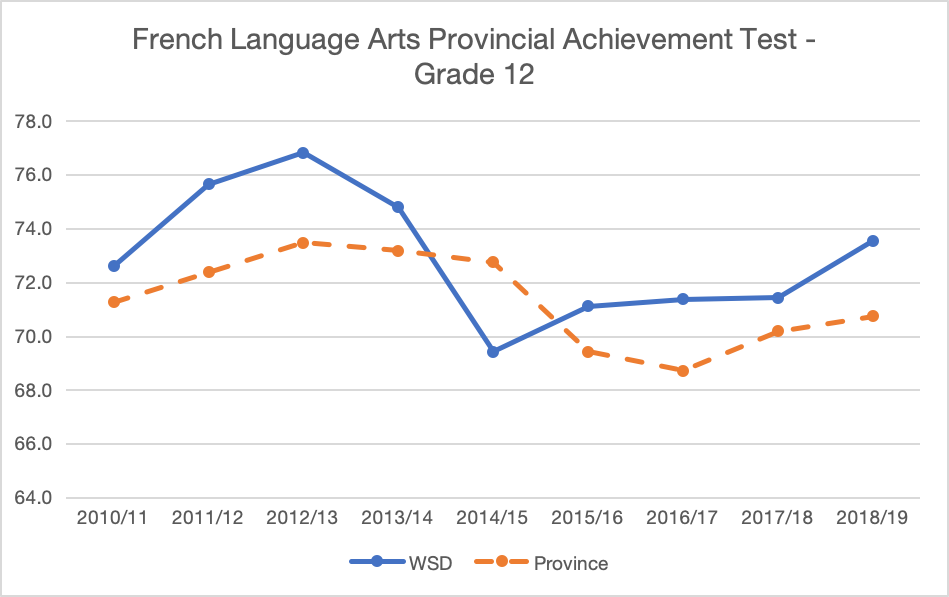
FRENCH IMMERSION ENROLMENT
| Year | N | K | 1 | 2 | 3 | 4 | 5 | 6 | 7 | 8 | 9 | 10 | 11 | 12 | Total |
| 2014/15 | 133 | 504 | 497 | 491 | 400 | 366 | 302 | 284 | 247 | 246 | 188 | 149 | 135 | 154 | 4096 |
| 2015/16 | 160 | 435 | 542 | 461 | 449 | 366 | 341 | 283 | 279 | 235 | 196 | 165 | 143 | 135 | 4190 |
| 2016/17 | 151 | 456 | 499 | 515 | 442 | 418 | 344 | 325 | 276 | 273 | 201 | 184 | 160 | 142 | 4386 |
| 2017/18 | 152 | 493 | 521 | 478 | 471 | 410 | 391 | 328 | 326 | 255 | 220 | 183 | 173 | 159 | 4560 |
| 2018/19 | 162 | 513 | 570 | 497 | 447 | 448 | 376 | 372 | 307 | 310 | 187 | 188 | 174 | 166 | 4717 |
GRADUATION RATES
To calculate their student-tracked high school graduation rates, Manitoba Education follows students from their entry into Grade 9 until their graduation four, five or six years later. An adjustment is applied to account for attrition due to any number of factors, including death, moving out of province, changing divisions, or relocating to a First Nations School, Adult Learning Centre or Non-funded Independent School. The method by which this adjustment is made is not clear, but is simply reflected in the final calculations as presented by Manitoba Education.
The student-tracked high school graduation rates for all cohorts of four-year (“on-time”), five and six-years show a noteworthy upward trend since initial Grade 9 entry of September 2009.
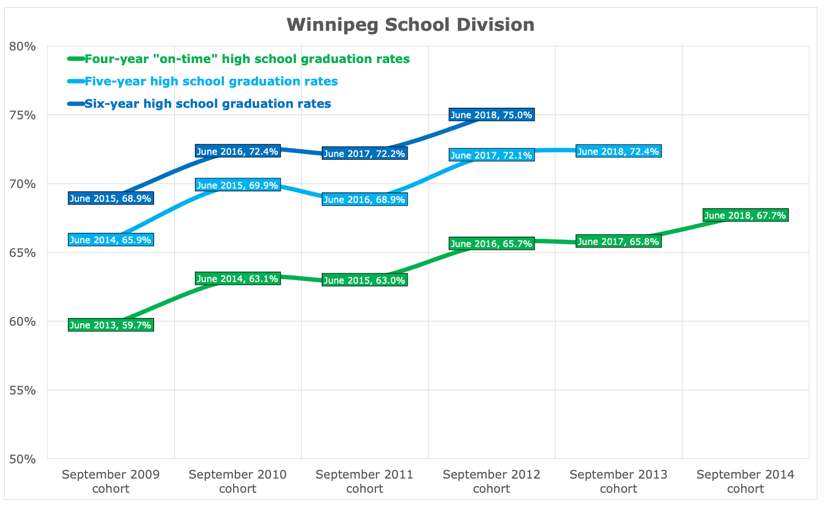
Unfortunately, this data does not capture the full range of celebratory graduation data sets within Winnipeg School Division.
Between September 2008 (corresponding to a graduation year of 2009) and September 2018 (corresponding to a graduation year of 2019), enrollment in Winnipeg School Division remained relatively stable, with a difference of only 492 students between September 30 on 2008 and 2018. With this minute difference in enrollment, it is then significant to note that 1611 diplomas were awarded in 2009, compared to 2144 in 2019 – an increase of 33.1 percent.
The number of French Immersion diplomas awarded during this same period increased by 64 percent.
2018/19 was an outlier, as 137 students graduated with vocational credentials. The previous record of the past ten years had been 45. This represents 6.4 percent of 2019 WSD graduates who are leaving Winnipeg School Division either workforce-ready, or well-positioned to continue their post-secondary education in the trades.
Over the course of the last decade, the number of diplomas earned by Mature Students has increased dramatically from 89 in 2009, to 310 in 2019. This increase of nearly 250 percent is indicative of all the efforts on the part of Winnipeg School Division and its community to empower adults to achieve their educational goals.
When taking into consideration all of the different kinds of diplomas awarded in Winnipeg School Division in any given year, compared against the original size of the Grade 9 cohort four years prior, the upward trend of successful diploma attainment is more marked, and a more accurate representation of the progress made in WSD over the last decade.
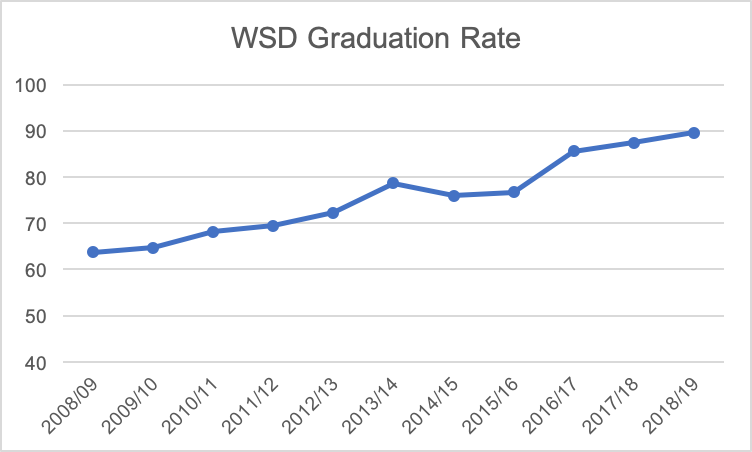
The WSD Graduation Rate is the result of the quotient of the aggregated total of English, French Immersion, Vocational and Mature Student diplomas awarded and the Grade 9 enrolment count four years prior.
WINNIPEG SCHOOL DIVISION PLAN 2019/2020
The Winnipeg School Division 2019/2020 Plan is the result of the consolidation of individual school reports and plans and input from division leaders, consistent with the principles of the 2016-2020 WSD Strategic Plan, and the WSD Principles of Learning. All school reports and plans are examined by WSD Senior Administration and are reviewed with Principals and Vice-Principals during school visits and monthly cluster meetings.
In addition to school-specific priorities, leaders were asked to focus on three of the seven strategic priorities:
- Students – To provide robust and comprehensive education, equitable access, diverse opportunity and a supporting learning environment for all students to help them prepare for their journey with learning and social justice and to be responsible community members;
- Learning outcomes – To further improve school attendance, achievements and graduation rates through the exploration of additional programs and strategies; and
- Addressing barriers to learning – To further develop initiatives and innovative approaches addressing individual student needs and accessibility requirements, mental health issues, childcare needs and nutritional needs.
SCHOOL-BASED CONTINUOUS IMPROVEMENT REPORT AND PLANNING PROCESS
The Winnipeg School Division’s school-based Continuous Reporting and Planning Process was introduced at the February 2019 meeting of Principals and Vice Principals. The process focuses on provincial numeracy and literacy assessments, and requires schools to consider their own unique data sets in order to set attainable one-year achievement targets. Through the Spiral of Inquiry framework, schools are asked to explore causal factors for achievement levels, planning for instruction and teacher professional development accordingly. The reporting process necessitates an analysis of actions and interventions undertaken in order to support student achievement, and allows for the inclusion of classroom-based assessments and report card information as a companion to the interpretation and reporting of provincial assessment data.
The method to set attainable one-year targets, and aspirational three and five-year targets, differs from what is expected at the school level. Divisional targets were set largely based on the assumption of a linear trendline of the available data. The large population size being considered for division-wide targets permits broader generalizations than the small population of students within a school. Divisional targets were shared with schools in the fall of 2019.
The school-based reporting and planning process was implemented in spring 2019, with direct in-school support from members of the Professional Support Services group, and through meetings of school clusters, led by Directors.
Submitted reports were reviewed by WSD Senior Administration, with the intent of providing feedback and assistance with planning forward to schools, as well as for the purpose of identifying strengths, challenges, and next steps for inclusion in this report and plan.
With the expectation that the school-based continuous improvement report and plan is a year-long formative process, rather than simply summative in nature and a static plan, support and reinforcement will continue to be provided by members of the Professional Support Services group, by Directors through regular cluster meetings, and in collaboration at quarterly meetings of all Principals and Vice Principals.
Sample School-Based Continuous Improvement Report and Plan Templates are included as an appendix to this document.
TARGETS
EARLY & MIDDLE YEARS
Grade 3 Provincial Assessment for Reading
By fall of 2019, 50 percent of students will meet expectations in all subcompetencies in the Grade 3 provincial assessment for reading.
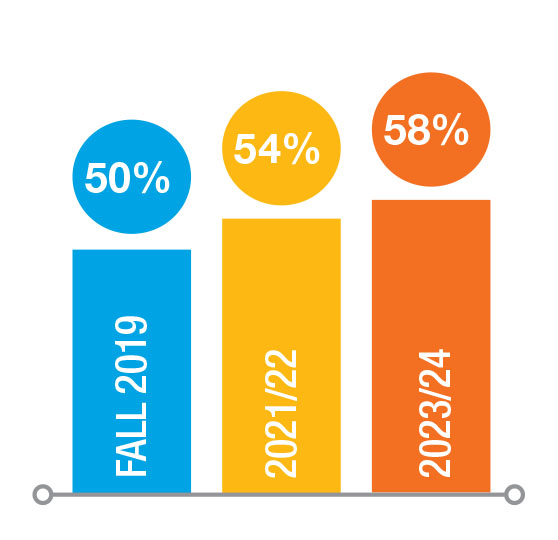
Grade 3 Provincial Assessment for Numeracy
By fall of 2019, 47 percent of students will meet expectations in all subcompetencies in the Grade 3 provincial assessment for numeracy.
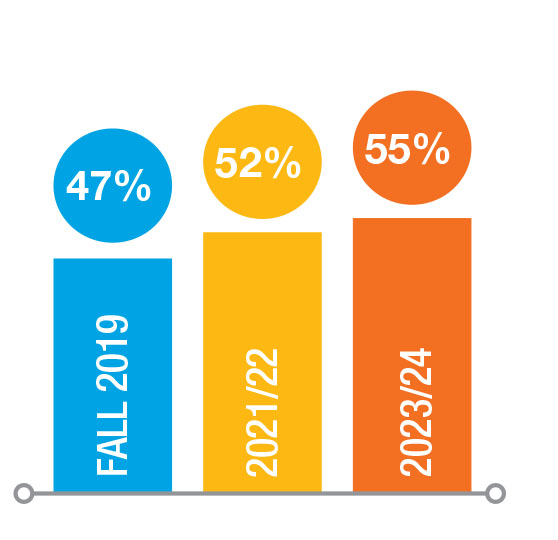
Grade 4 Provincial Assessment for Reading (French Immersion)
By fall of 2019, 50 percent of students will meet expectations in all subcompetencies in the Grade 4 provincial assessment for reading.
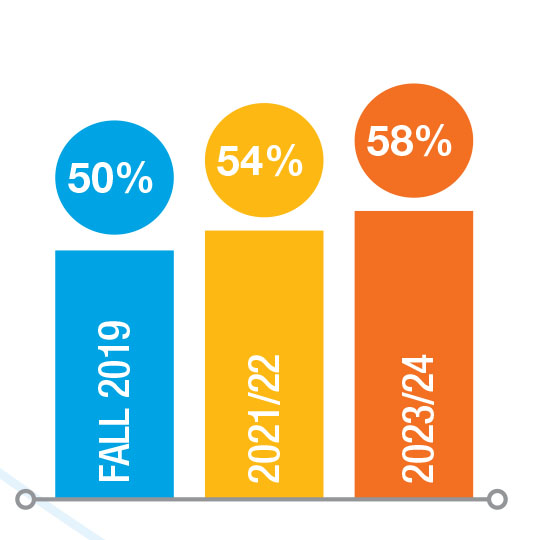
Grade 7 Provincial Assessment for Number Sense and Number Skills
By January 2020, 37 percent of students will meet mid-grade performance in all sub-competencies in the Grade 7 provincial assessment for number sense and number skills.
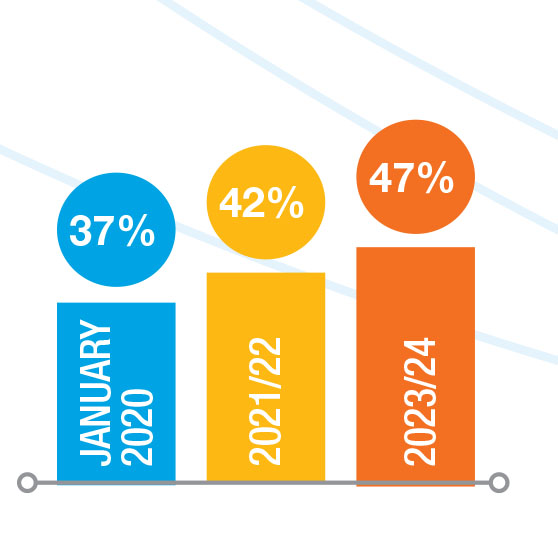
Grade 8 Provincial Assessment for Reading Comprehension in English
By January 2020, 53 percent of students will meet mid-grade performance in all sub-competencies in the Grade 8 provincial assessment for reading comprehension in English.
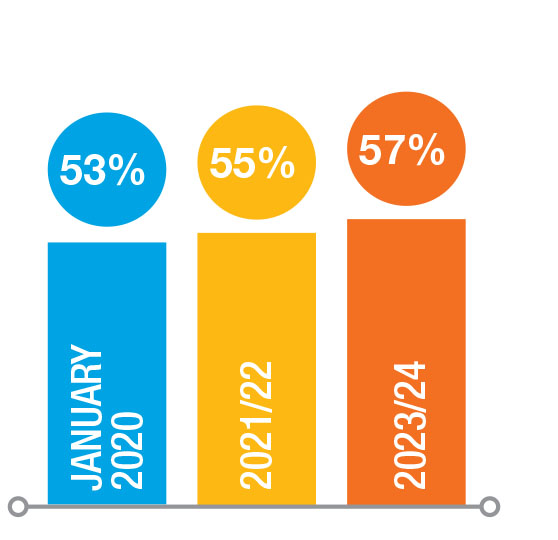
Grade 8 Provincial Assessment for Expository Writing in English
By January 2020, 49 percent of students will meet mid-grade performance in all sub-competencies in the Grade 8 provincial assessment for expository writing in English.
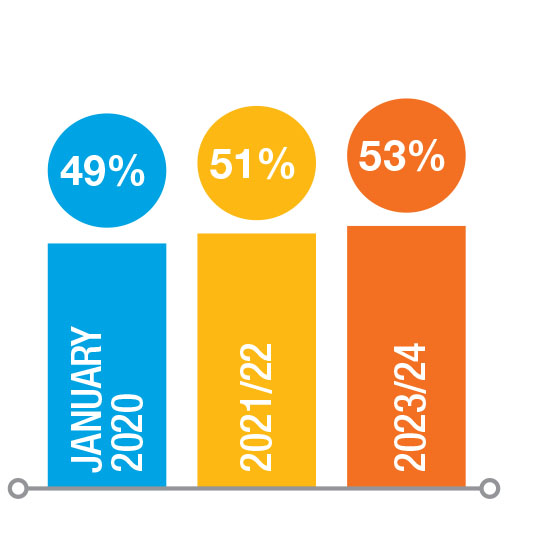
Grade 8 Provincial Assessment for Reading in French
By January 2020, 60 percent of students will meet mid-grade performance in all sub-competencies in the Grade 8 provincial assessment for reading comprehension in French.
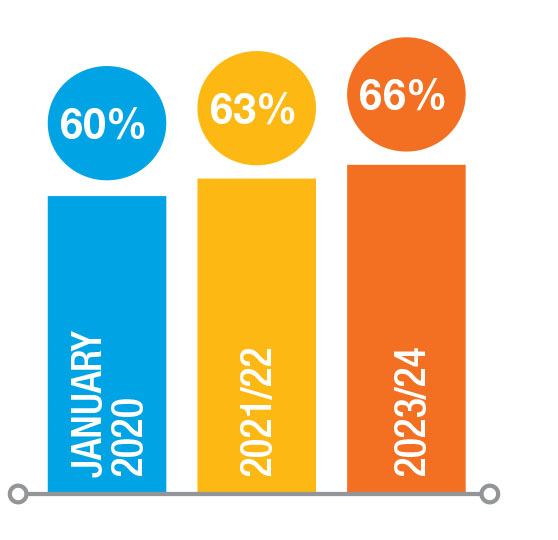
Grade 8 Provincial Assessment or Expository Writing in French
By January 2020, 44 percent of students will meet mid-grade performance in all sub-competencies in the Grade 8 provincial assessment for expository writing in French.
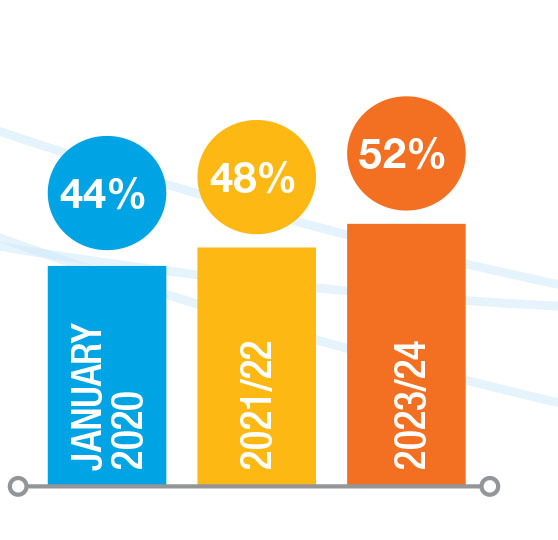
TARGETS
SENIOR YEARS
Grade 9 Credit Attainment – Mathematics and English Language Arts
By June 2023, 95 percent of students will receive appropriate educational programming to ensure they successfully complete their credits in English Language Arts and Mathematics.
Grade 12 English Language Arts Achievement Test
By June 2020, the average mark on the Grade 12 provincial test in English Language Arts will be 67 percent.
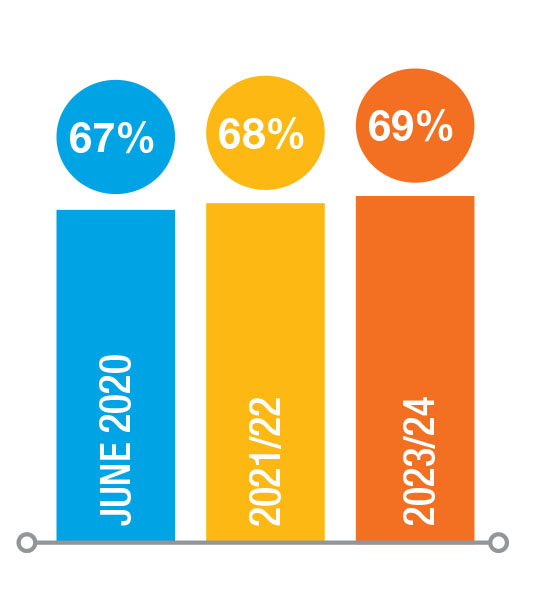
Grade 12 French Language Arts Achievement Test
By June 2020, the average mark on the Grade 12 provincial test in French Language Arts will be 75 percent.
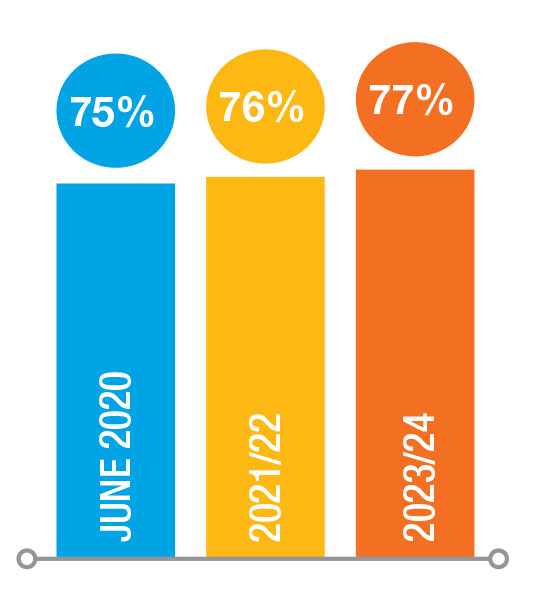
Grade 12 Pre-Calculus Mathematics Achievement Test
By June 2020, the average mark on the Grade 12 provincial test in Pre-Calculus Mathematics will be 75 percent.
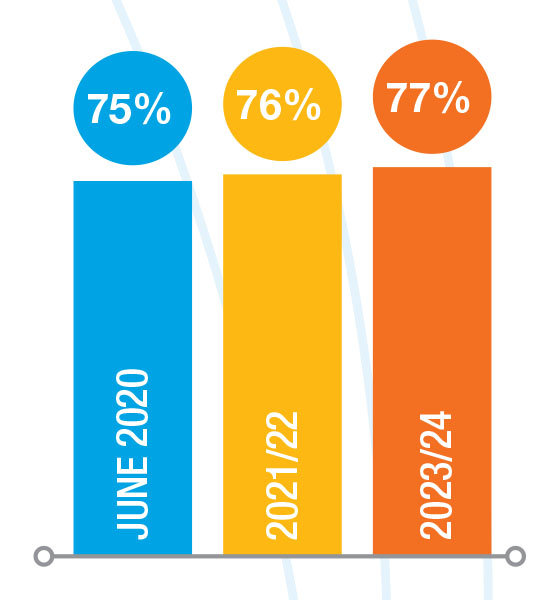
Grade 12 Applied Mathematics Achievement Test
By June 2020, the average mark on the Grade 12 provincial test in Applied Mathematics will be 61 percent.
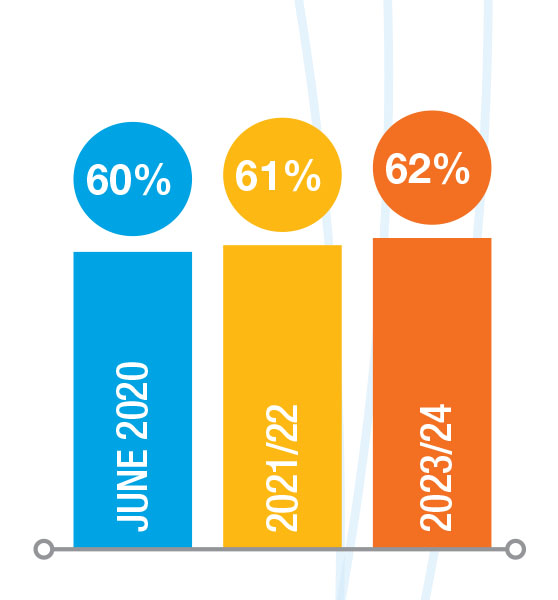
Grade 12 Essential Mathematics Achievement Test
By June 2020, the average mark on the Grade 12 provincial test in Essential Mathematics will be 58 percent.
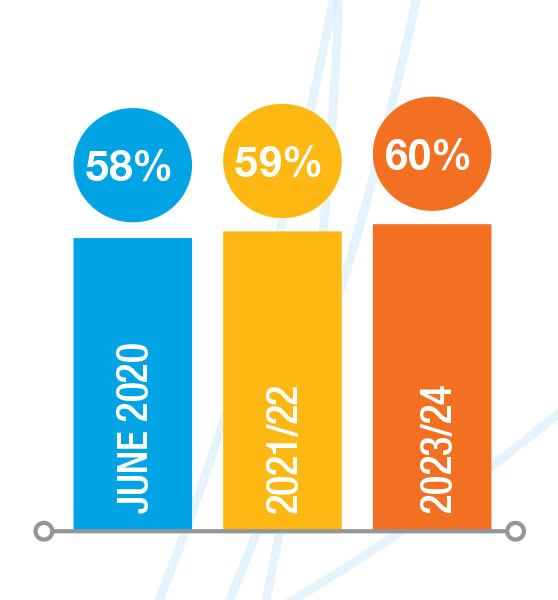
SUPPORT FOR PROFESSIONAL LEARNING AND GROWTH
The Winnipeg School Division 2019/2020 Plan is support by a network of community partnerships and dedicated professionals, including a newly restructured Professional Support Services (PSS) team. WSD has moved from domain-specific Program Leads and Support Teachers to a team of Program Leads and Program Support Teachers, equipped to support literacy and numeracy across all content areas, in addition to their own area of expertise.
This new structure came into effect September 1, 2018, and initial efforts were concentrated on developing team competencies relative to program management, inquiry and data analysis. Members of the team have had the opportunity to participate in professional learning opportunities such as the Visible Learning Institute (John Hattie), Collective Efficacy (Jenni Donohoo) and the Spiral of Inquiry (Linda Kaser and Judy Halbert).
The current model of six four-day weeks spent working directly in schools, with the fifth day reserved for team planning and meetings, provides for intervening weeks of focused collaboration and division-initiated professional learning. To date, for example, the team has been provided with ongoing training in Indigenous perspectives in education and learning technologies.
While in schools, members of the PSS team provide coordinated and job-embedded support for planning, instruction, professional learning, assessment and sustainability. Monitoring of the PSS team and their needs is the purview of the Directors and Superintendents.
“The team was highly responsive to the needs of the teachers and the intervention provided was aligned with the modelling and communicating of math targets in the school plan.”
“The PSS team was able to build capacity in all grades throughout their time at our school by showing support, building confidence and inspiring our staff to go deeper in their learning.”
SUPPORT FOR INSTRUCTIONAL LEADERSHIP DEVELOPMENT
In addition to existing support structures such as the New Vice-Principals Group and the Professional Support Services team, Winnipeg School Division is developing a comprehensive strategy encompassing all areas of leadership – from the establishment of core competencies to recruitment, training and evaluation.
A set of leadership competencies – expectations for all leaders in WSD – has been developed and is undergoing final revisions. These competencies will form the foundation of the training and development of leaders in the division.
In the 2018/19 school year, the Core Leadership series, consisting of professional learning opportunities focused on the fundamentals of leadership, communication, workplace safety and health, governance and dispute resolution, was developed. Essential and recommended trajectories for the various leaders in Winnipeg School Division have been identified, and the second series, providing position-specific training is under development.
The second series, specific to Instructional Leaders, provides for professional learning around foundations of professional practice, instructional decision-making, instructional coaching, and instructional design and practice. Differing entry points for aspiring and existing leaders will be made available, depending on the nature of their position, and position-specific needs.
In addition to the Leadership series, Winnipeg School Division also has a Professional Learning and Leadership Centre (PLLC) based on both Canadian and international research. PLLC helps early-service teachers build peer support networks and best practices under the guidance of experienced teacher-mentors.
PLLC also provides training for mentors so they can meet the needs of their mentees. Some of the common areas where early-service teachers request further assistance include creating a classroom culture for learning, classroom management, and inquiry/project-based learning.
PLLC began in 2008 with 21 schools. Mentors were trained over two years in how to conduct learning-focused conversations. In 2013, the program was extended to include all WSD schools as a two-year mentorship program for early service teachers with two-years or less of term teaching experience. External colleagues were invited from the Faculty of Education at the University of Manitoba to review the program and engage in participatory action research.
Dr. Francine Morin, Professor of Curriculum, Teaching and Learning with the University of Manitoba’s Faculty of Education, noted that the PLLC Teacher Induction and Mentoring Program has integrated annual evaluation to ensure continuous improvement.
CONCLUSION
In conclusion, Winnipeg School Division has been focusing on the continued improvement of student achievement with very positive results, shown as growth over time. We will continue to maintain high expectations for all students and staff, emphasizing a culture of continuous learning with an emphasis on leadership, mentoring and professional development. We will continue to assess the efficacy of our programs to narrow what is being offered to the most impactful, efficient and evidence-based programs.
In order to ensure our continued success, Winnipeg School Division would appreciate the support of the province in the following ways:
- Recognition of, and support for, the challenges faced by many students with regard to attendance, achievement and other socio-economic barriers. With the range of needs spread across a diverse demographic, this requires cross-jurisdiction coordination and cooperation that cannot be sustained by schools alone.
- Clear and consistent provincial expectations for literacy and numeracy, including support for a collaborative process for curriculum implementation.

 WSD Continuous Improvement Report 2018-2019 and Plan 2019-2020.pdf
WSD Continuous Improvement Report 2018-2019 and Plan 2019-2020.pdf